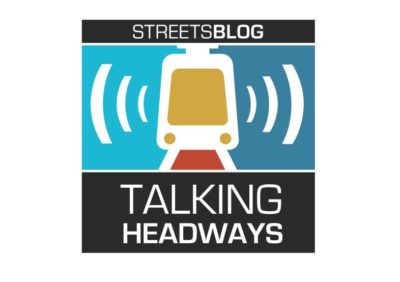This week, we’re chatting with Angie Schmitt about her new book "Right of Way: Race, Class, and the Silent Epidemic of Pedestrian Deaths in America" (Island Press). Schmitt, the former editor of Streetsblog USA, talks with us about why she wrote the book and what she hopes folks can take away from it.
If you prefer to listen rather than read, an edited transcript follows the player. If you want the full unedited transcript (with typos!), click here.
Jeff Wood: You wrote a piece about autonomous vehicles and Phoenix and, you know, how they are just kind of letting it go — not even thinking about pedestrians even though Phoenix's streets and streets in the Sunbelt in general, as you mentioned in the book, are a particularly dangerous.
Angie Schmitt: Definitely. I think like, one of the themes in the books and I've been travelling around and making presentations about this. One of the points I make over and over again is this issue of pedestrian safety gets overlooked because the people who are being killed are just very marginalized. One of the things in the book is how racism plays into it. Black and Hispanic people and native folks are at increased risk for being killed. Also in a city like Phoenix, it's more likely to be a person of color who would be walking in the first place, relying on a bus, but also very poor people. In some of the cities that have lousy transit, which is sort of the norm right in the U.S., the people who are walking and places like, like that just don't have a lot of political power. So when, when they were killed, it's so easy for everyone to just ignore it and move on. Or let's put it this way, it's been too easy for people to do that.
JW: Yeah. And a lot of stories in the book, which are heart-wrenching towards the end, I wonder how you dealt with it kind of going into the book and writing all these stories about people who had been killed by traffic violence, you know, knowing that something could have been done to save their lives.
AS: Yeah. It's really sad. Later in the book, there was a couple people who are heroes who are trying to make a difference. But, yeah, one of the things that inspired me to write this book was the group, Families for Safe Streets that got started in New York. For people who don't know, it's a group, mostly for parents who lost children to traffic crashes, they got together and formed and they started doing political activism around safe streets in New York.
Since they were formed, there's been chapters spreading up across the United States. But I interviewed a couple of the women who lost children. Amy Cohen talks about how overwhelming her grief was after her 12-year-old son was killed in New York while he was walking. She talks about being on not being able to sleep, being unable to eat, just going through hell. Right, you know, I have two kids. My second child was born a little bit before I started writing this. And I think something changes in you when you have a kid and you start worrying about like, that's the worst thing that can happen to you, your kid dying.
And I think then in my head I was sort of playing around with my worst nightmare, this happening to the one of my kids and hearing stories. I've really had a lot of sympathy for them. And I don't think for this issue, compared to a lot of other issues, like for the opioid epidemic or if there's a death related to domestic violence, you might get like a very sympathetic profile as a victim in a publication. Well, we don't see that very much for people who are killed in car crashes, even though it's such a big part of our culture. I think that's part of the problem.
JW: Yeah. And a few words leapt off the pages at me and you used them a number of times. And I think they're kind of emblematic of how we should treat this kind of epidemic: sympathy, empathy, but also you use the word "complacency" a lot. What role do people's emotions actually play in this problem. You kind of alluded to it in your previous answer, but I'm curious, thinking more about kind of how people are less empathetic.
AS: Yeah. I'm trying not to curse. It's a very messed up.
JW: I can bleep it if you want.
AS: That's really fucked up some of this stuff. There is a case I was talking about. It was in the D.C. area. There had been seven or eight people killed in the course of a week. So one of the news stations there wrote a story about it, but the headline of the story called them "lazy." So they were paraphrasing this police officer who basically said its their own fault. They're lazy. They're not going to the crosswalks. And if you look at it, like some guy was killed by a drunk driver in a hit-and-run. It's hard to believe that people who were tragically killed would be slandered in their hometown press like that.
There's not a lot of other kinds of deaths where that would still fly. Even an opioid death or a suicide, which historically would have been a really stigmatized kind of death, there has been sort of subconsciousness raising about that. And we're a lot more sensitive with how we print those kind of incidents. But that hasn't happened yet with this.






